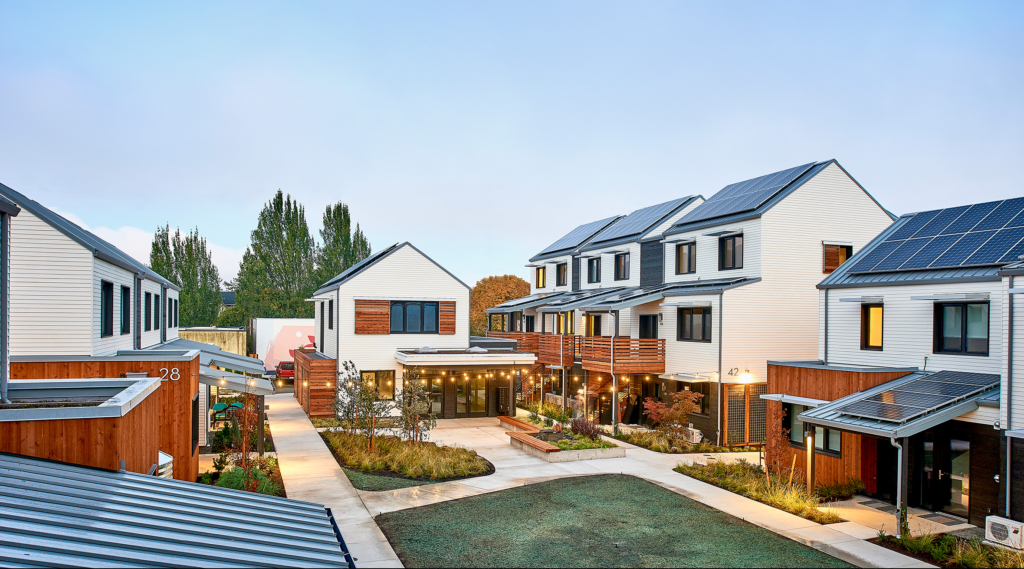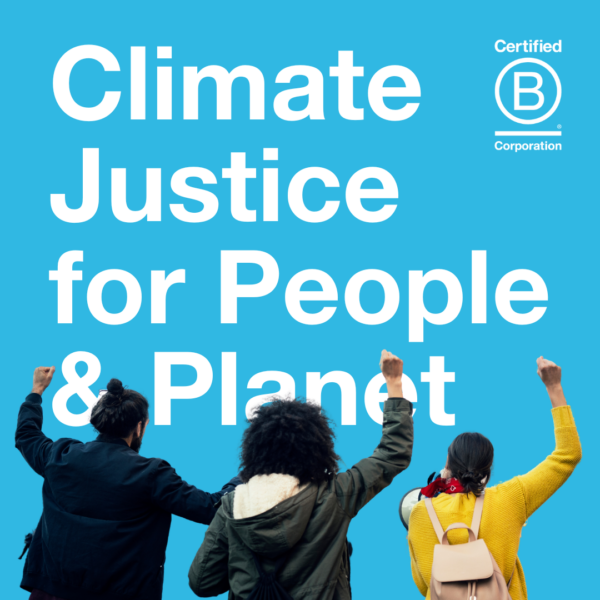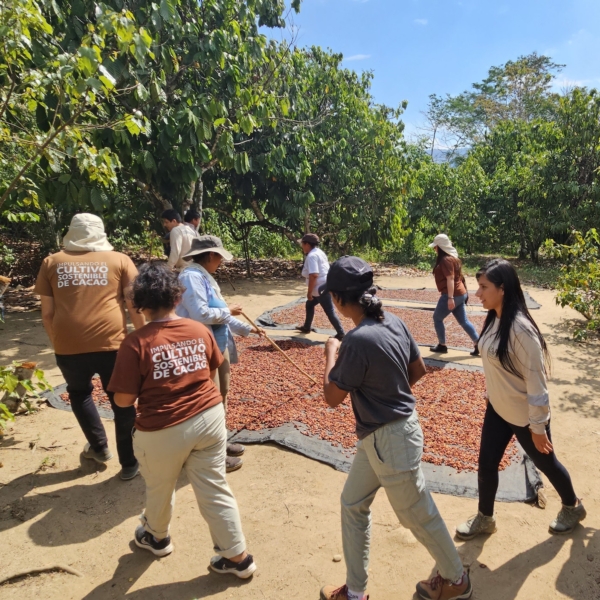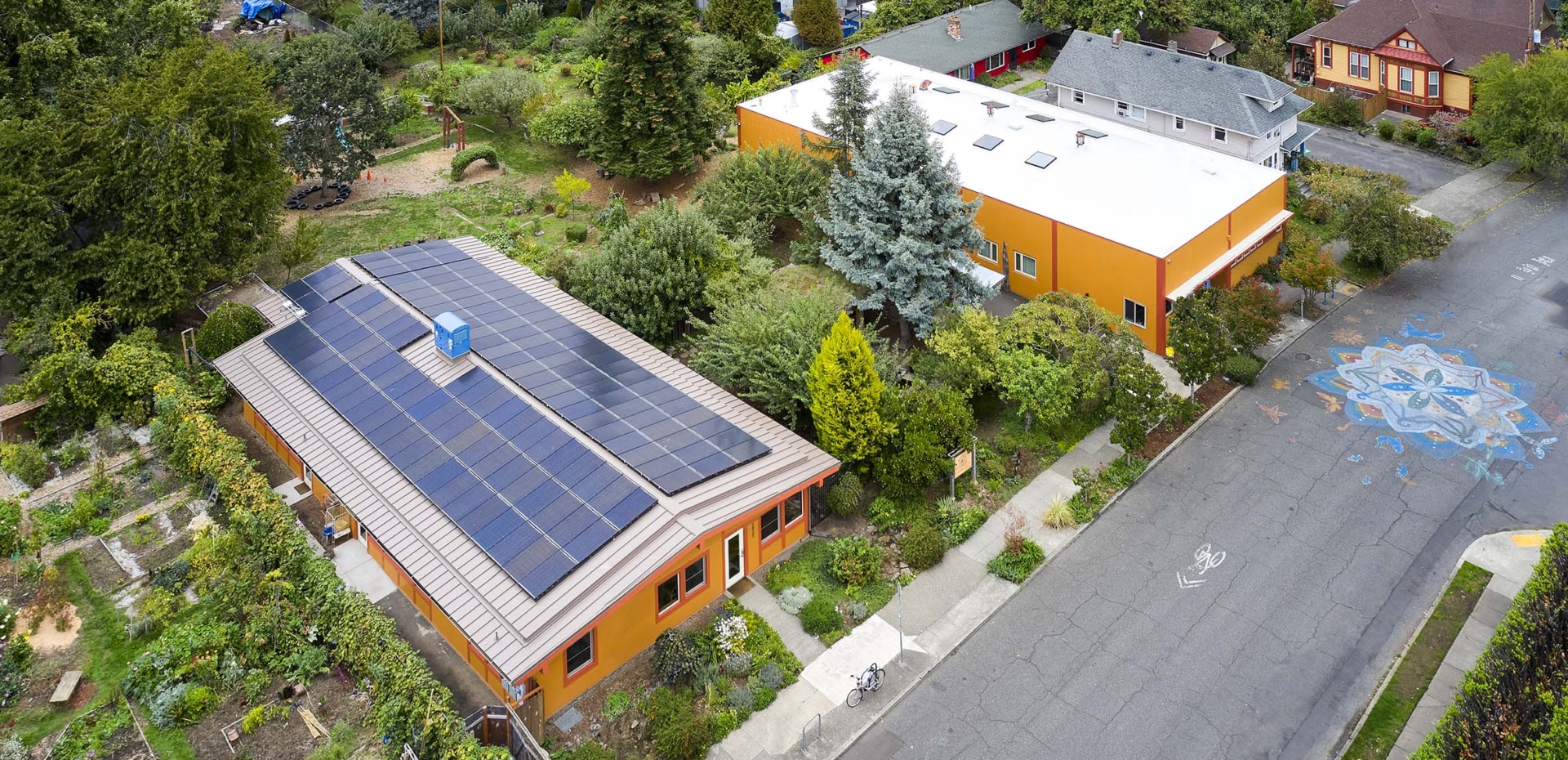Payoff for People and Planet: B Corps Help with the Transition to Renewable Energy
June 12, 2024
Business Services Reduce Barriers to Solar Energy and Enhance Efficiency
Expanding the use of renewable energy is one strategy that businesses and communities can use to reduce their environmental impact. Switching to natural sources such as solar or wind energy reduces the use of fossil fuels and related emissions, helping to mitigate the effects of climate change and harness the Earth’s renewable resources.
Numerous Certified B Corporations are committed to helping sustainably minded businesses, homeowners, and communities reduce their energy consumption and transition to renewable sources. By connecting more people with renewable energy, these companies are creating a long-term framework for positive environmental and social impact.
B Corps Green Hammer, Omnidian, and PosiGen share how their unique services — from building design to solar optimization to equitable access — are collectively expanding the use and benefits of renewable energy.
Green Hammer: Energy-Efficient Buildings with Renewable Focus
B Corp Green Hammer, a design-build firm based in Portland, Oregon, focuses on energy efficiency and the transition to all-electric systems so rooftop solar can offset all the energy used on-site. Green Hammer Founder and President Stephen Aiguier said most homes and structures the company builds utilize heat pump heating and cooling systems, heat pump water heaters, and induction cooking.
“We encourage shifting away from natural gas or propane as a direct energy supply, as they are less adaptable to a future clean energy transition, especially as our grid continues to shift away from fossil fuels,” Aiguier said. “There are also air quality and safety benefits of eliminating gas combustion from inside buildings, which aligns with our B Corp values.”

Tillamook Row is a zero-energy community in Portland, Oregon, with a mix of owner and renter units. The five buildings were designed using Passive House standards and modeling to meet zero-energy goals, meaning the buildings will produce all or more of their energy needs from an 82-kilowatt solar array. (Photo courtesy Green Hammer)
Aiguier noted that the more energy-efficient the building, the smaller and less costly its renewable energy system needs to be. Green Hammer applies the Passive House standard, which can cut building energy loads by 60% to 90% through insulation, airtight construction, high-performance windows, and advanced ventilation systems. After these reductions, Green Hammer recommends hiring a professional solar installer to design an appropriately sized solar system.
Aiguier said financing can be challenging for businesses investing in on-site renewable energy, but rebates, grants, and tax incentives can significantly offset the initial investment costs. Green Hammer works with utilities and organizations like the Energy Trust of Oregon and the U.S. Department of Agriculture to secure cash rebates and grants for its clients and provides documentation for state and federal tax credits. It’s an effort that he said pays off. “Investing in on-site renewable energy projects can be economically and environmentally beneficial while also sending a signal to employees and customers that your business is serious about reducing your carbon footprint,” Aiguier said.

A New Set of Climate Justice Case Studies
Certified B Corporations are incorporating justice in their climate action with services and products designed for positive social and environmental impact. This set of B Corp climate justice case studies produced by B Lab U.S. & Canada and B Corp Measure Meant studies highlights examples and concepts to inspire other businesses.
Omnidian Boosts Efficiency and Long-Term Success of Solar Investments
Once a solar system is installed, Washington-based B Corp Omnidian provides comprehensive solar performance services, including advanced monitoring, diagnostics, and remediation. Omnidian helps its clients optimize their solar investments and ensure maximum efficiency and performance of their solar assets. “For one of our customers, we improved their assets’ performance index by 14% across six months,” said Tyler Portenier, Omnidian’s Commercial Channel Sales Manager.
Portenier said financing, permitting, and even supply chain issues can be challenges during the transition to clean energy. Failing to forecast or budget for operating expenses can take new solar customers by surprise. “Many renewable energy sources, particularly solar, are expected to last for 20-plus years, and while you can’t predict everything that may go wrong, you need enough room in your budget upfront to ensure your investment stays operational and performing at maximum capacity for that entire lifecycle,” Portenier said.

The Omnidian team provides comprehensive solar performance services, including advanced monitoring, diagnostics, and remediation.
Whatever the model, obstacles will likely exist as the process unfolds, but the payoff is well worth the effort. Omnidian CEO Mark Liffmann encourages businesses and others transitioning to renewable energy to stay committed to the process and be ready to tell their success stories.
“It will take time — often years — to see the financial and environmental impact of your investment, but it will happen,” Liffmann said. “Take note of every positive change you experience, and spread the word across your teams, your industry, even your friends and family. We need more clean energy in this world to fight climate change, and your voice could make a difference.”

Impact Topic in Practice Guide
This guide focuses on the Environmental Stewardship & Circularity Impact Topic, which asks companies to take a conscientious and sustainable approach and to become environmental stewards, demonstrating accountability and leadership. Download the guide for examples and resources to support your business in meeting the requirements within this Impact Topic.
PosiGen Expands Access to Renewable Energy Through Solar Leasing Partnerships and Community Programs
Louisiana-based B Corp PosiGen is a solar developer that works to expand the use of renewable energy by serving homeowners in underserved communities and reducing their utility bills. Through solar leasing partnerships, PosiGen helps homeowners avoid significant upfront costs and income requirements so they can make an easier switch to solar energy and save on utility costs.
Since its founding in 2011, PosiGen has expanded to serve more than 25,000 residential customers in 14 states and the District of Columbia. Partnership programs with states, cities, and community organizations help illustrate the B Corp’s impact:
- Connecticut Green Bank’s Solar For All: This program serves more than 4,400 families who have saved an average of $700 in the first year, with those savings increasing yearly. Sixty-five percent of these customers were below the median income, and over 60% were located in economically distressed municipalities.
- Solarize Philly: This Philadelphia project prompted a sharp increase in solar adopters with incomes below $50,000 per year, making Pennsylvania the state with the lowest average household income for solar adopters in 2022.
- Solar For All NOLA: In addition to increasing access to solar energy, the New Orleans program aims to provide free education and outreach opportunities that underscore the benefits of going solar and support the expansion of the city’s green workforce. This program helped make Louisiana the leader in equitable rooftop solar as more than 60% of solar adopters have incomes below $100,000 per year.
Learn how several B Corps are making the switch to solar power and other lower-impact options.
-

-

-

-

Environmental Justice
Partnerships and Tools for Business Climate Justice and Reconciliation
Read More
Sign Up for our B The Change Newsletter
Read stories on the B Corp Movement and people using business as a force for good. The B The Change Newsletter is sent weekly.
